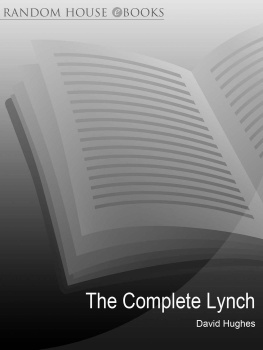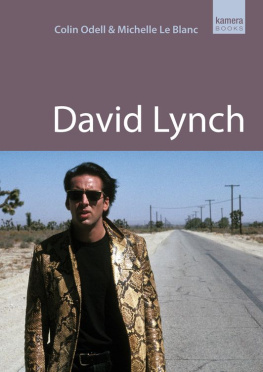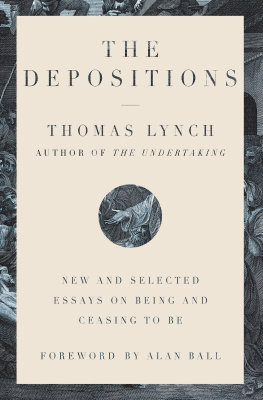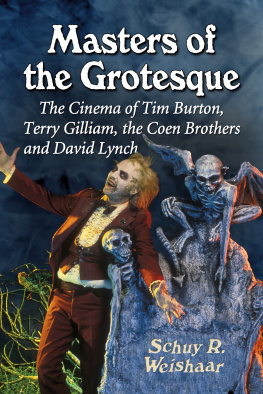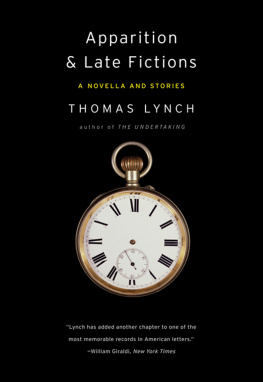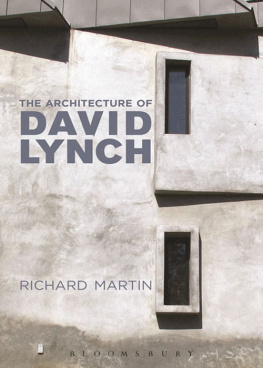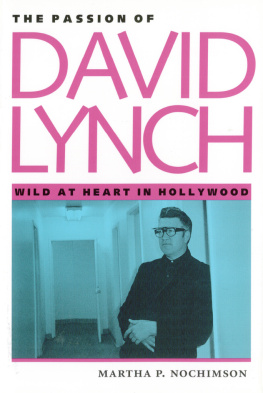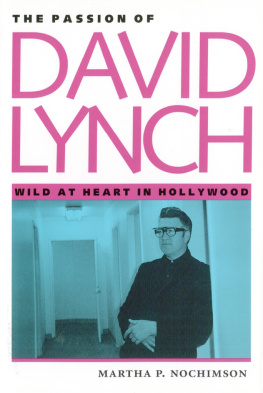DAVID LYNCH SWERVES
DAVID LYNCH SWERVES
Uncertainty from Lost Highway to Inland Empire
MARTHA P. NOCHIMSON
UNIVERSITY OF TEXAS PRESS
AUSTIN
Copyright 2013 by the University of Texas Press
All rights reserved
Printed in the United States of America
First edition, 2013
Requests for permission to reproduce material from this work should be sent to:
PERMISSIONS
University of Texas Press
P.O. Box 7819
Austin, TX 78713-7819
http://utpress.utexas.edu/about/book-permissions
Library of Congress Cataloging-in-Publication Data
Nochimson, Martha.
David Lynch swerves : uncertainty from Lost Highway to Inland Empire / by Martha P. Nochimson. First edition.
p. cm.
Includes bibliographical references and index.
Includes filmography.
ISBN 978-0-292-72295-8 (cloth : alk. paper) 1. Lynch, David, 1946 Criticism and interpretation. I. Title.
PN1998.3.L96N53 2013
791.4302'3092dc2012040910
doi: 10.7560/722958
ISBN: 978-0-292-74460-8 (e-book)
ISBN: 978-0-292-74889-7 (individual e-book)
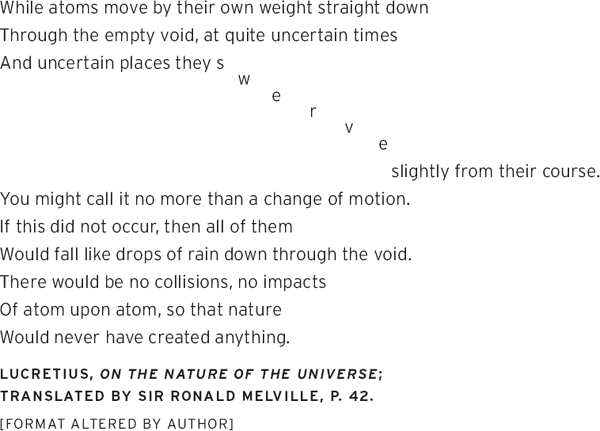
CONTENTS
.
.
.
.
.
.
PREFACE
CRITIC ON FIRE
Ring the bells that still can ring
Forget your perfect offering
There is a crack, a crack in everything
Thats how the light gets in.
LEONARD COHEN, ANTHEM
In The Passion of David Lynch (1997), aided by the ideas of Carl Jung, I followed Lynch up to the boundaries of ordinary cultural discourse as he looked beyond them to much larger realities. Tracing a path from Lynchs early student work to Twin Peaks: Fire Walk with Me, I argued that to understand the Lynchian vision we must open ourselves up to Lynchs unique depiction of an organic reality that lies beyond the limits we, as a part of a culture that obsessively draws lines, have imposed on our lives. True enough, but not quite the whole story. Although, at the end of that book, I commented briefly about Lost Highway as if it could be understood within the framework I had outlined, I eventually found myself faced with a need to recognize that that film and Lynchs subsequent cinema have dramatically altered the circumstances of Lynch criticism. Hence the need for David Lynch Swerves.
With my first book about Lynch, I became one of the pioneers of a major redirection of Lynch criticism. We moved toward an examination of his characters interior lives in order to illuminate Lynchs originality as a cinematic storyteller. I emphasized the levels of consciousness in his characters, and the optimism Lynch radiated through his portrayals of the visionary capabilities of his incandescent heroes, especially Special Agent Dale Cooper (Kyle MacLachlan). And I would have liked to say that, wielding my copy of Jung, I provided the necessary map and the flashlight for Lynchs filmography, world without end. But I cant. Although my critique provided much-needed new clarity about the Lynch work that preceded Lost Highway (1997), try as I might to believe otherwise, it did very little to help the critical conversation about the story of Fred Madison (Bill Pullman). My doubts grew into a nagging dissatisfaction with what I had said, or not said, about the notorious scene on the lawn in Lost Highway in which the life of the films protagonist, Fred Madison, takes an astonishing turn. In that extraordinary and original scene, Fred undergoes a physical metamorphosis into another person, and we see it happening. There is a molecule-by-molecule interpenetration of the body of Pete Dayton (Balthazar Getty), whom Fred has never met before, by the body of Fred Madison, a moment that seriously challenges our ordinary understanding of how bodies and matter function. By the time I had seen Lost Highway (1997) for the third or fourth time, I knew that with this film, Lynch had undergone a crucial artistic change. He had moved beyond limits he had previously only approached, and I had to let go of old assumptions (once again) and follow him.
I stand by what I said in my first book, as far as it went. At the time I wrote it, given what Lynch had then revealed to me about his sense of a universal unity linking us all, Jungs ideas seemed to help explain the intriguing growth and development of Lynchs visionary protagonists in his work up to Twin Peaks: Fire Walk with Me. But Jung didnt have a word to say about Lynchs shifting emphasis in Lost Highway and in his subsequent films, in which many very disorienting images of the physical world took center stage. Then I remembered that for twenty years, Lynch had mentioned physics to me whenever we talked, and I began to investigate his cinema, especially from Lost Highway to the present, with quantum mechanics and relativity in mind. My more recent, post-1997, increasingly revealing conversations with Lynch have confirmed my new directionand given me a new frame of reference.
The climactic moment came on March 18, 2010, when Lynch and I spent three hours talking in his compound in the Hollywood Hills. In a long, frank, unguarded conversation, Lynch told me about his vision of the physical world as an uncertain place that masks important universal realities, enunciated for him not by Carl Jung, but by the Holy Vedas of the Hindu religion. At the same time that Lynch told me that he is fascinated by physics, he emphasized that he knows very little about the nuts of bolts of the scientific method used by physicists. (I barely graduated from high school.) He was more comfortable vividly describing the universal center of consciousness evoked by the Hindu holy text. His wholehearted affirmation of his Vedic map of the universe made it clear why he re mains optimistic about life even though he finds the physical landscape on which we live to be unstable.
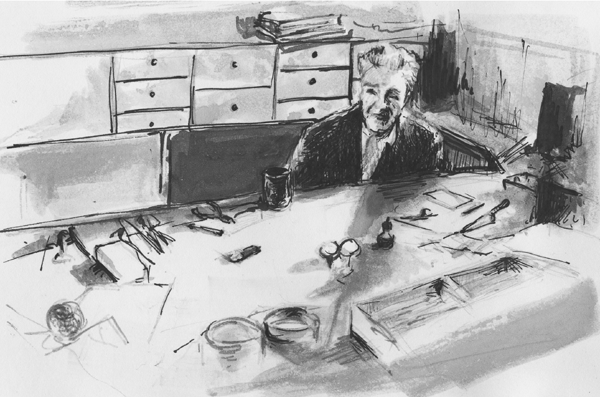
David Lynch in his hillside retreat, the site of our March 18, 2010, interview.
As Lynch spoke, he burned away my Jungian ideas. Nevertheless, much that he said also corresponded remarkably with the scientific constructs relating to the disorienting, shifting plane of objects and bodies that emerged from experiments conducted by modern physicists in the 1920s, theories that since then have identified even more intense mysteries about the physical plane of life. Lynchs passionate words about the Vedas, and the specter of modern physics that haunted our discussion, generated sparks when they struck against each other in my mind. The tinder burst into flame, casting a new, more illuminating light on Lynchs filmsincluding that mysterious night on the lawn.
Next page

